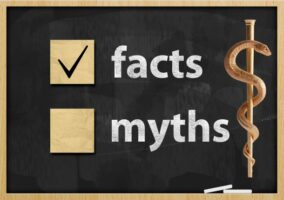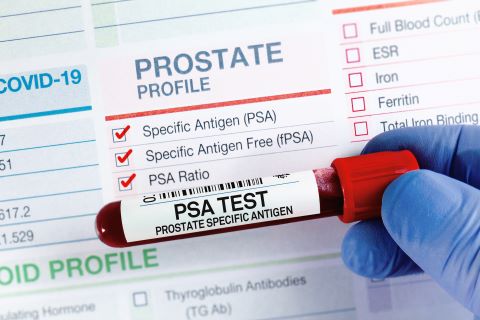Prostate Cancer Myths and Popular Beliefs: What’s True and What’s Not True?
Men looking for information on prostate cancer have a lot of information to sift through. And while there is plenty of reliable information out there, there are also quite a few myths and misconceptions swirling around, often spread online through unreliable sources or by word via well-meaning but uninformed people.

But it’s important to know the facts. Prostate cancer is the second most common cancer in men, according to the American Cancer Society. In fact, about 1 in 8 men will be diagnosed with prostate cancer during their lifetime.
The goal of this article is to debunk false information and clarify some of the issues medical scientists still debate. For topics still in debate, we put this information into context using current, peer-reviewed research.
Here are some of the most common questions and areas of debate.
Do vasectomies raise a man’s risk for prostate cancer?
When considering their birth control options, many men choose vasectomy. This surgical procedure is simple, safe, and effective, with an estimated success rate of 99.95%.
For many years, scientists have investigated whether a vasectomy can raise the risk of prostate cancer.
Over the last few years, it has been reported that vasectomies do not cause prostate cancer. The Mayo Clinic reports that “[a]lthough there have been some concerns about a possible link between vasectomy and testicular or prostate cancer in the past, there’s no proven link.”
It’s possible that vasectomy itself might not increase risk, but more prostate cancer cases might be discovered during pre-vasectomy medical exams.
Does frequent ejaculation reduce risk for prostate cancer?
Scientists have studied the relationship between ejaculation frequency and prostate cancer for several years. Some think that ejaculation flushes out harmful substances in the semen that could be linked to prostate cancer.
Research results have been mixed. For example, the authors of a 2018 Journal of Sexual Medicine study found that men who ejaculate 2 to 4 times a week were at lower risk for prostate cancer. But other researchers have reported no association.
Does eating flaxseeds affect prostate cancer risk?
Flaxseeds are a popular dietary supplement. They are thought to help with constipation, diabetes, heart disease, and other conditions. Could prostate cancer be another?

Scientists don’t know for sure. Flaxseeds contain phytoestrogens, which are similar to estrogen, a hormone naturally produced by the body. Some researchers believe that this property might affect the risk of hormone-related cancers, like prostate cancer. Other studies have found that flaxseeds don’t impact prostate cancer risk at all.
Nowadays, the effects of flaxseeds on prostate risk isn’t clear, and scientists continue to study the relationship.
The effects of flaxseeds on prostate risk isn’t clear
However, some experts suggest that men who already have prostate cancer might benefit from flaxseeds, as flaxseeds have been associated with lower PSA levels and decreased tumor aggressiveness. (PSA is a protein made by the prostate. Lower PSA levels suggest that prostate cancer cells are growing more slowly.)
Can pomegranate reduce or slow down prostate cancer growth?
In the past, studies have suggested that drinking pomegranate juice might slow the growth of prostate cancer cells. It was thought that pomegranates contained antioxidants and other substances that might reduce inflammation and lower PSA levels.
However, experts now report that there isn’t enough evidence to support the use of pomegranate for the treatment or prevention of prostate cancer.
Is prostate cancer less dangerous than other types of cancers because it grows more slowly than other types of cancers?
Many men with prostate cancer have a good prognosis, especially if the cancer is caught early and hasn’t spread outside the prostate gland. Prostate cancer tends to grow slowly, and men might not need treatment right away. (In this case, they might opt for active surveillance: Their cancer will be closely monitored, but they won’t receive treatment until they have symptoms or until the cancer becomes more aggressive.)
However, this isn’t the case for all men. The American Cancer Society estimates that 268,490 new cases of prostate cancer will be diagnosed in 2022, and about 34,500 men will die of the disease this year.
So the answer is, “No, it’s not less dangerous.” Men need to follow their doctor’s treatment instructions as prescribed and keep themselves as healthy as they can. Doctors can guide men on healthy lifestyle habits.
Is prostate cancer a disease of older men only? Do young men ever get prostate cancer?
It’s true that prostate cancer is more common in older men. According to the American Cancer Society, about 60% of new prostate cancer cases are diagnosed in men aged 65 or older. The average age at diagnosis is 66. And prostate cancer is rare in men younger than 40.

But that doesn’t mean prostate cancer isn’t possible in younger men. Forty percent of new cases are in men under age 65. And some men have risk factors, such as a family history of prostate cancer, that could make them more vulnerable when they’re younger.
Men who are concerned about their prostate cancer risk should ask their doctor about screening.
Does prostate cancer run in families?
Scientists aren’t certain what, exactly, causes the disease
Prostate cancer can run in families. If a man has a first-degree relative (parent or brother) with prostate cancer, his risk for developing prostate cancer is about 2 to 3 times higher than average. His chances of having prostate cancer go up even higher if he has more than one first-degree relative with prostate cancer and if these relatives were diagnosed at a younger age.
Still, most cases of prostate cancer are not family-related. Scientists aren’t certain what, exactly, causes the disease.
Can an enlarged prostate (aka BPH) lead to prostate cancer?
It is possible for a man to have an enlarged prostate and prostate cancer, even at the same time. But there’s nothing about an enlarged prostate that makes a man more likely to get prostate cancer.
The medical term for an enlarged prostate is benign prostatic hyperplasia (BPH). The word benign is an important one here, as it means there is no cancer present. As a man gets older, his prostate gland usually becomes larger. For some men, this isn’t a problem. But for others, the prostate growth squeezes the urethra (the tube that allows urine to exit the body) and makes urination difficult.
Enlarged prostate and prostate cancer do have similar symptoms, including trouble passing urine. Men who experience these symptoms should see their doctor for a checkup. (Learn more about enlarged prostate treatments.)
Does prostate cancer always have symptoms?
Actually, prostate cancer often has no symptoms, especially in its early stages. That’s why it’s so important to be screened, especially for men with risk factors.
Prostate cancer often has no symptoms
Common symptoms include urination difficulties, painful ejaculation, and blood in the urine or semen. Other urologic conditions, such as prostatitis (inflammation of the prostate), can have these symptoms, too. That’s why doctors do a complete checkup if men have these symptoms.
Is PSA testing reliable for diagnosing prostate cancer? Does having a high PSA level means a man has cancer?
PSA stands for prostate-specific antigen, a protein produced by the prostate. It is used to screen for prostate cancer, but it is not the only test that is used.

Having high levels of PSA could mean that a man has prostate cancer. But it could mean other things as well. For example, men with prostatitis or an enlarged prostate (benign prostatic hyperplasia or BPH) may also have elevated PSA levels.
If a man’s PSA screening shows high PSA levels, his doctor will consider his health history, symptoms, and the results of other tests (such as a digital rectal exam) to decide how to proceed. If prostate cancer is suspected, a biopsy may be done. During a biopsy, a small portion of prostate tissue is removed and examined for cancer cells.
Does having a prostate biopsy cause cancer to spread? Can prostate cancer cells “break off” during a biopsy?
If a doctor suspects prostate cancer due to a man’s symptoms, family history, etc., a prostate biopsy is usually the next step in evaluation. During a biopsy, a surgeon removes a small piece of tissue. A pathologist examines the sample under a microscope. If cancer cells are found, doctors use biopsy information to determine the stage and grade of the cancer and develop a personalized treatment plan.
Some patients worry that cancer cells can break off and spread during the biopsy procedure.
While there have been case reports of this happening, it is quite rare. The benefits of having a biopsy far outweigh the risk of cancer cells spreading during the procedure.
Does prostate cancer always require surgery?
Radical prostatectomy — the surgical removal of the prostate gland — is a common prostate cancer treatment.
But not all men with prostate cancer have surgery. For example, radiation, chemotherapy, and hormonal therapy are other treatment options.
In some cases, the cancer doesn’t need to be treated right away.
As mentioned above, some men may choose active surveillance. If their cancer doesn’t appear to be aggressive, they may hold off on any treatment. At that point, a healthcare professional regularly monitors their cancer’s progress, and treatment begins only when necessary.
When recommending prostate cancer treatment, specialists consider many factors, including the stage and risk level of the cancer and the patient’s age, overall health, and treatment preferences.
Note: Another surgical option is orchiectomy — removal of the testicles. These organs produce testosterone, a hormone that helps prostate cancer cells grow. Removing the testicles greatly reduces the amount of testosterone available to cancer cells.
Can prostate cancer negatively affect a man’s sex life? Do men still enjoy sex after prostate cancer treatment?
Sexuality is a big concern for men with prostate cancer, and rightly so. Certain treatments, such as surgery to remove the prostate gland (radical prostatectomy), can damage the nerves responsible for erections. This can lead to erectile dysfunction (ED). Treatments might also change the way that ejaculation and orgasms feel.
Fortunately, there are treatments available for ED and other sexual issues. It may take some time and adjustments, but men can still enjoy sex after prostate cancer.
Does prostate cancer impact a man’s fertility?
Prostate cancer treatment may make it more difficult for a man to father a child. Some men have their testicles removed as part of prostate cancer treatment, and without these organs, they cannot produce sperm. If the prostate and seminal vesicles are removed, there will be no prostatic fluid produced to protect sperm cells.
Radiation and chemotherapy can affect the production of sperm and prostatic fluid, too.
Some men bank their sperm before their treatment begins. With this method, their sperm is frozen and used later for in vitro fertilization. It may also be possible to extract sperm from the testicles, if they haven’t been removed.
Resources
American Cancer Society
“How Cancer And Cancer Treatment Can Affect Fertility in Males”
(Last revised: February 6, 2020)
https://www.cancer.org/treatment/treatments-and-side-effects/physical-side-effects/fertility-and-sexual-side-effects/fertility-and-men-with-cancer/how-cancer-treatments-affect-fertility.html
“Key Statistics for Prostate Cancer”
(Last revised: January 12, 2022)
https://www.cancer.org/cancer/prostate-cancer/about/key-statistics.html
“Prostate Cancer Risk Factors”
(Last revised: June 9, 2020)
https://www.cancer.org/cancer/prostate-cancer/causes-risks-prevention/risk-factors.html
Cancer.net (American Society of Clinical Oncology)
“Can a Biopsy Make My Cancer Spread?”
(March 18, 2021)
https://www.cancer.net/blog/2021-03/can-biopsy-make-my-cancer-spread
“Prostate Cancer: Risk Factors and Prevention”
(Approved: September 2021)
https://www.cancer.net/cancer-types/prostate-cancer/risk-factors-and-prevention
Healthline.com
Tan, Verena, RD, PhD
“Top 10 Health Benefits of Flax Seeds”
(April 26, 2017)
https://www.healthline.com/nutrition/benefits-of-flaxseeds
Journal of the National Cancer Institute
Husby, Anders, et al.
“Vasectomy and Prostate Cancer Risk: A 38-Year Nationwide Cohort Study”
(Full-text. Published: May 23, 2019)
https://academic.oup.com/jnci/article/112/1/71/5497506#191830044
Journal of Sexual Medicine
Jian, Zhongyu MD, et al.
“Sexual Activity and Risk of Prostate Cancer: A Dose–Response Meta-Analysis”
(Abstract. Published: August 16, 2018)
https://www.jsm.jsexmed.org/article/S1743-6095(18)31064-6/fulltext
Mayo Clinic
“Vasectomy”
(August 21, 2021)
https://www.mayoclinic.org/diseases-conditions/prostate-cancer/expert-answers/vasectomy/faq-20058022
Bauer, Brent A., MD
“Pomegranate juice: A cure for prostate cancer?”
(June 4, 2021)
https://www.mayoclinic.org/diseases-conditions/prostate-cancer/expert-answers/pomegranate-juice/faq-20058204
MedicalNewsToday.com
Brazier, Yvette
“How healthful is flaxseed?”
(January 9, 2020)
https://www.medicalnewstoday.com/articles/263405
MedlinePlus.gov
“Prostate-Specific Antigen (PSA) Test”
(Page last updated: November 30, 2020)
https://medlineplus.gov/lab-tests/prostate-specific-antigen-psa-test/
Memorial Sloan Kettering Cancer Center
“Pomegranate”
(Last updated: September 8, 2021)
https://www.mskcc.org/cancer-care/integrative-medicine/herbs/pomegranate
National Cancer Institute
“Prostate Cancer, Nutrition, and Dietary Supplements (PDQ®)–Patient Version”
(Updated: January 11, 2022)
https://www.cancer.gov/about-cancer/treatment/cam/patient/prostate-supplements-pdq
“Prostate Cancer—Patient Version”
https://www.cancer.gov/types/prostate
“Prostate-Specific Antigen (PSA) Test”
(Updated: February 24, 2021)
https://www.cancer.gov/types/prostate/psa-fact-sheet
“Understanding Prostate Changes: A Health Guide for Men”
https://www.cancer.gov/types/prostate/understanding-prostate-changes
Oncology Nutrition
“Flaxseed and Prostate Cancer Risk”
(Page updated: April 2019)
https://www.oncologynutrition.org/erfc/healthy-nutrition-now/foods/flaxseed-prostate-cancer-risk
Prostate Cancer and Prostatic Diseases
Xu, Yawei, et al.
“Association between vasectomy and risk of prostate cancer: a meta-analysis”
(Abstract. Published: April 29, 2021)
https://www.nature.com/articles/s41391-021-00368-7
Prostate Cancer Foundation
“Five MORE Myths and Misconceptions About Prostate Cancer”
(February 8, 2018)
https://www.pcf.org/blog/five-myths-misconceptions-prostate-cancer-2/
“Five Myths and Misconceptions About Prostate Cancer”
(February 2, 2018)
https://www.pcf.org/blog/five-myths-misconceptions-prostate-cancer/
“Prostate Cancer Symptoms and Signs”
(Last reviewed: October 5, 2020)
https://www.pcf.org/about-prostate-cancer/what-is-prostate-cancer/prostate-cancer-symptoms-signs/
ScienceDaily.com
“Cancer biopsies do not promote cancer spread, research finds”
(January 9, 2015)
https://www.sciencedaily.com/releases/2015/01/150109093717.htm
Urology Care Foundation
“Does Having More Ejaculations Lessen the Chance of Prostate Cancer?”
(Fall 2020)
https://www.urologyhealth.org/healthy-living/urologyhealth-extra/magazine-archives/fall-2020/ask-the-experts-does-having-more-ejaculations-lessen-the-chance-of-prostate-cancer
Moyad, Mark A., MD, MPH
“No More Myths: Prostate Cancer, Flaxseed and Pomegranate”
(September 21, 2015)
https://www.urologyhealth.org/healthy-living/care-blog/no-more-myths-prostate-cancer-flaxseed-and-pomegranate
“Prostate Biopsy: What You Should Know”
(Video)
https://www.urologyhealth.org/urology-a-z/p/prostate-cancer/videos/prostate-biopsy-what-you-should-know
“Urology Mythbusters: Fall 2020”
https://www.urologyhealth.org/healthy-living/urologyhealth-extra/magazine-archives/fall-2020/urology-mythbusters-fall-2020
“Urology Mythbusters: Winter 2020
”https://www.urologyhealth.org/healthy-living/urologyhealth-extra/magazine-archives/winter-2020/urology-mythbusters-winter-2020
“What is Prostate Cancer?”
(Updated: August 2018)
https://www.urologyhealth.org/urologic-conditions/prostate-cancer
WebMD
Griffin, R. Morgan
“Can Sex, Masturbation Affect Prostate Cancer Risk?”
(Reviewed: April 22, 2022)
https://www.webmd.com/prostate-cancer/ejaculation-prostate-cancer-risk
Weill Cornell Medicine
“Prostate Cancer Myths and Facts”
(June 19, 2018)https://weillcornell.org/news/prostate-cancer-myths-and-facts